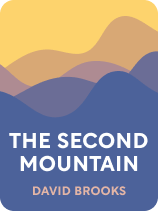

This article is an excerpt from the Shortform book guide to "The Second Mountain" by David Brooks. Shortform has the world's best summaries and analyses of books you should be reading.
Like this article? Sign up for a free trial here.
How is personal character formed? Why should we look back into history? What are the pros and cons of intellectual pursuits?
In his book The Second Mountain, cultural commentator David Brooks contrasts the individualist approach to life with the relationalist approach. He argues that you should embrace relationalism—the worldview that prioritizes selflessness and service to others—to lead a deeply fulfilling life.
Keep reading for The Second Mountain quotes that provide insight into the book’s themes.
The Second Mountain Quotes
We present The Second Mountain quotes along with some context and explanation so that you get a good idea of what Brooks means to convey.
“Character emerges from our commitments.”
In light of individualism’s shortcomings, Brooks recommends an alternative approach: relationalism. While individualism values personal freedom and independence, relationalism values commitment and service. Consequently, Brooks argues that the relationalist approach provides meaning and fulfillment by satisfying our deep-seated desire for loving relationships.
First, Brooks clarifies that the relationalist approach is centered around commitment. In short, he defines commitment as a promise made out of love to something or someone, without expecting something in return. Moreover, Brooks clarifies that committing to something requires shifting your behavior to serve it, even if love wavers. For instance, committing to a spouse might require tending to their needs, even if you lose your romantic affection for them.
“People who look backward to see the heroism and the struggle that came before see themselves as debtors who owe something, who have some obligation to pay it forward.”
First, Brooks observes that the intellectual life requires exposure to the varying moral worldviews that were prominent throughout history—including, for instance, the Greek moral system that prized honor and the Christian moral system that prized humility. In turn, intellectual commitment fosters open-mindedness and the ability to evaluate these varying moral systems.
Historically, Brooks notes, religious commitment has been a source of internal peace amidst external hardship. For example, he cites the experience of Soviet dissident Aleksandr Solzhenitsyn. The Biblical story of Job—who retains his faith in the face of extreme suffering and loss—illustrates the importance of patience, persistence, and trust.
“The hard part of intellectual life is separating what is true from what will get you liked.”
Brooks asserts that the intellectual life teaches us intellectual courage, the capacity for seeking out what is true rather than merely what is popular. Although this won’t satisfy the ego’s vain desire for approval and recognition, Brooks implies that it satisfies our deeper desire for truth and knowledge.
“That is the thing you notice about second-mountain people. There’s been a motivational shift. Their desires have been transformed.”
The intellectual life, according to Brooks, involves the relentless pursuit of truth and moral development. Brooks suggests that we should commit to the intellectual life because it teaches us to pursue the highest desires—like truth, wisdom, and flourishing. To show as much, Brooks outlines an array of virtues from the intellectual life—such as open-mindedness, objectivity, and intellectual courage—that he says help elevate our desires.
“The central problems of our day flow from this erosion: social isolation, distrust, polarization, the breakdown of family, the loss of community, tribalism, rising suicide rates, rising mental health problems, a spiritual crisis caused by a loss of common purpose, the loss—in nation after nation—of any sense of common solidarity that binds people across difference, the loss of those common stories and causes that foster community, mutuality, comradeship, and purpose.”
According to Brooks, the prevailing individualism in Western culture is responsible for the erosion of community. In response, he argues that the relationalist approach to life requires committing to local communities because these communities help serve our neighbors.
Robust local communities can mitigate this loneliness. In such communities, Brooks claims that rich relationships exist between neighbors, who live selflessly and are devoted to caring for one another. In turn, healthy communities prevent lonely individuals from falling through society’s cracks.

———End of Preview———
Like what you just read? Read the rest of the world's best book summary and analysis of David Brooks's "The Second Mountain" at Shortform.
Here's what you'll find in our full The Second Mountain summary:
- The negative consequences of the West's focus on individualism
- Why you should embrace relationalism to lead a fulfilling life
- The four commitments that constitute relationalist living






